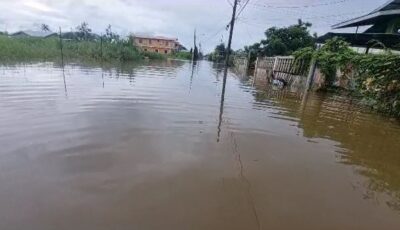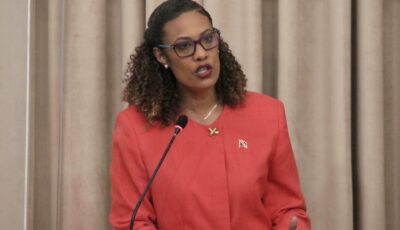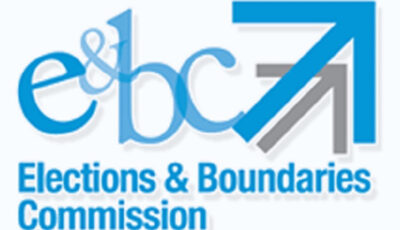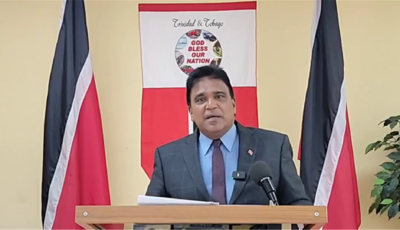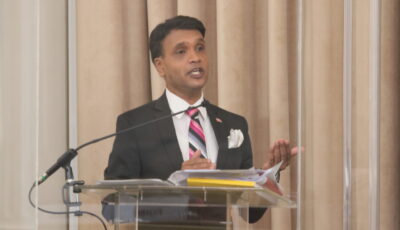Speaking Notes of PM Kamla on laying the 1990 coup report in Parliament
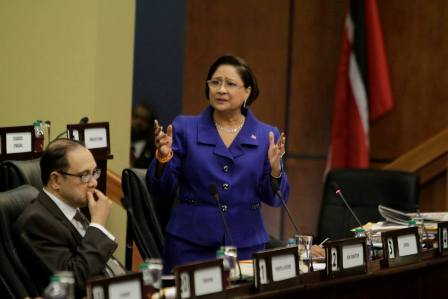
The Honourable Kamla Persad-Bissessar, Prime Minister of Trinidad and Tobago
Courtesy: Office the Parliament
Speaking Notes of
The Honourable Kamla Persad Bissessar, SC, MP
Prime Minister of Trinidad and Tobago
in the House of Representatives
on
Friday, 14th March, 2014
Concerning The Report of the Commission of Enquiry into the Events Surrounding the attempted Coup D’état of 27th July 1990
Mr. Speaker, as members of this Honourable House would be aware, a Commission of Inquiry in the attempted Coup of 27th July 1990, was initiated by my Government and appointed on September 06th 2010 on my advice to then acting President of our Republic, His Excellency Mr. Timothy Hamel-Smith.
It was a major and paramount decision taken early by our Partnership Government to inquire into the infamous and ill-fated attempted Coup of 1990.
Yesterday, the Chairman of the Commission presented its voluminous report to the President, His Excellency, Justice Anthony Carmona, who immediately forwarded a copy of the Report to me as Prime Minister.
It is instructive, Mr. Speaker, that the Commissioners noted in the preamble that prior to their appointment as a Commission in 2010, (which I note was soon after we took office), there was no official public inquiry into the circumstances surrounding the attempted coup which occurred twenty year earlier in 1990.
I am pleased today, Mr. Speaker to immediately lay this Report for the benefit of members in this Honourable House and national community.
The report contains four volumes and chapter 12 contained in volume 4 was deemed confidential and we respect the Commission for this.
But after due deliberation at the NSC, the government agreed that we would waive confidentiality and place the entire report in the public domain. We did not want the report to be shadowed, there is nothing to hide.
Can we congratulate all the commissioners for all their work.
PRESIDENT ROBINSON
Mr. Speaker. The nation is fully aware that our illustrious former President and Prime Minister, Mr. A N Robinson was the prime target in the attempted Coup of 1990.
The Report confirms that a central mission of the insurgency involved the life of Mr. Robinson.
Today, we are saddened that his health has now taken a down turn.
He is currently hospitalised and we join in collective prayer for his well-being.
Earlier today, before I came to the Parliament, I took the opportunity as Prime Minister, but perhaps moreso in my own personal capacity as a citizen of Trinidad and Tobago, one, along with countless other citizens of our Nation, one who has been inspired and strengthened by his leadership and demonstrated courage, that he has shown and as a person who has benefitted from the wisdom and sagacity of this internationally renowned son of our soil, I paid a visit to Mr. Robinson.
The visit was brief, given the prevailing circumstances, but I wanted to convey to His Excellency, the fact that the Commission of Enquiry, which he deeply urged I should establish, had completed its monumental task and had presented its report to the President.
I wish Mr. Speaker to dedicate the laying of this Report in this House, which Mr. Robinson served for so many years, to former President His Excellency Mr Robinson.
I think that we can recall that he has been steadfast over the years in his calls for us to bring a clearer understanding of those dark and tumultuous days which started on July 27th 1990 and which may have produced a different turn of events if Mr. Robinson was not of the calibre, with an immense and demonstrated sense of national loyalty to his country and its People, regardless of personal consequences.
I think that we all recall his unforgettable words:”Attack with full force!”
APPRECIATION TO THE COMMISSION
Mr. Speaker, I would at this point, first want to join His Excellency, Justice Carmona, on behalf on my Government, in extending our deepest appreciation to Sir David Simmons, QC, eminent Caribbean jurist, who led a distinguished team of Commissioners, which included Sir Richard Lionel Cheltenham, QC, Dr. Hafizool Ali-Mohammed, Dr. Eastlyn Mckenzie and Mrs Diana Mahabir-Wyatt.
These five Commissioners, admirably supported by Legal Counsel, and Administrative and Secretariat staff, devoted a considerable part of their lives over the past three and a half years to painstakingly inquire and produce a comprehensive report on an event which is indelibly inscribed in our history.
There is no doubt that the production of this Report and its immediate presentation to Honourable Members of this House is a signal event for all citizens of Trinidad and Tobago.
It fulfils one of the major Manifesto pledges made by the Partnership Government when we overwhelmingly earned the mandate of the People to assume Government on May 24 2010.
But more than just the meaningful fulfilment of a Manifesto and subsequent Governmental pledge to the People of the Country, it seeks to provide valuable answers and tangible lessons emanating from what has been regarded as a dark stain on our history.
I am mindful that although the 1990 Coup remained utterly perplexing and deeply vexatious, in fact offensive, to our citizens, our body politic and the very psyche of our Society, past Governments, including those represented by my colleagues across the aisle, when they were in Power, steadfastly chose not to want to bring greater examination and decisive closure to this sordid chapter in our history.
Citizens will recall, when I called on our illustrious former President, Excellency Arthur Robinson before the last general elections May 2010, he strongly urged that any Government I should lead, should institute such a Commission of Inquiry.
As I said earlier, he was central to the events as they unfolded when the band of insurgents stormed the Parliament on that fateful evening of July 27, 1990 and was made to personally suffer the grossest of indignities and humiliations together with other Parliamentarians, including Mr. Dookeran.
This morning when I visited His Excellency, Mr. Robinson, at the nursing home, I would send an inscribed bound copy of the Report for his personal library after laying it in Parliament.
It is my hope that the publication of this Report will bring considerable satisfaction and some closure to our former President who withstood the intended humiliation of those days of infamy with remarkable dignity and courage.
The strength and resilience he displayed at that time continue even to this day to inspire an entire Nation and remain a testimony and a beacon to all of us.
Mr. Speaker, with the official laying of this Report in the House, it is also being made available to the entire citizenry of Trinidad of Tobago through publication on the Parliament’s website and we want to thank the Parliament staff and your good self and the Clerk of the House.
The report is comprehensive, with detailed presentations and erudite analysis.
It is of course based on an abundance of oral and written submissions.
As members know, the terms of reference of the Commissioners included:
§ The causes, nature, extent and impact of the attempted coup;
§ The underlying purpose and extent of and the intention behind the plot;
§ Any criminal acts and omissions, including looting which were committed and the motives and objectives of the perpetrators of such acts and omissions;
§ The identity of any person or any local, regional, or international authority, institution, organisation or entity who:
o incited,
o masterminded,
o planned,
o directed,
o conspired towards,
o consented to,
o connived at,
o acquiesced in,
o participated in,
o aided or abetted the carrying out of,
o had prior knowledge of,
o or was implicated or otherwise involved in criminal acts or omissions,
o including looting, which were committed in connection with the attempted coup
o and the extent to which they had prior knowledge of,
o or was implicated
o or otherwise involved in,
any such acts or omissions
§ The national security deficiencies and breaches of law that facilitated the attempted coup and the extent to which it was possible to prevent the occurrence of the attempted coup
§ The response and performance of the Government, the Defence Force, the Protective Services and other essential services, the Foreign Service and the media during and after the attempted coup
§ All matters pertaining to the negotiation, preparation, execution and effect of the amnesty and the negotiation of the terms of surrender
§ And the continuing propensities of criminal activity arising from the attempted coup and the correlation, if any, between the attempted coup and the trafficking, supplying and possession of illegal drugs, firearms and ammunition.
The delivery of the Report yesterday came during a meeting of our National Security Council which I was chairing, we immediately began to review its contents, particularly the recommendations made by the Commissioners, including the ones which deal directly with our security arrangements and interests.
We have already decided to implement several of them and a further presentation will soon be made in this regard to this honourable House.
Contrary to what a few may have believed, this Commission of Enquiry which was initiated by my government, was never with the intent for witch-hunting , but to deal with a critical issue upon which our nation was faced with in our darkest hour.
Thankfully, our law enforcement officials stepped up to defend our democracy, and for that we would forever be grateful.
However, things went wrong.
Mistakes were made, prior to, during and immediately after that day of 27 July 1990 and based on the findings of this Commission of Enquiry, the recommendations would go a long way to ensure that there would be much less likelihood that history would repeat itself, it is better that we are prepared now than later, because if we wait for later, it may not cost us just dollars and cents, but also innocent lives that could be lost because of poor preparation and planning.
Because of what our nation would learn based on this very comprehensive report by the Commission of Enquiry, it allows us that opportunity to be better prepared now than later.
However, the findings would also greatly assist not just in prevention of further such eventualities, but to improve our National Security apparatus as a whole, as the policies stated in the Report equates with basic polices that are indeed needed to improve our law enforcement.
The findings of this Report would be of value now as it would provide recommendations ensure more professional, sustainable and result oriented law enforcement agencies, both in specific operations and also on a daily basis.
The Government of Trinidad and Tobago would indeed now drive forward to implement the recommendations stated.
However, based on intense research, I am pleased to state that some of these recommendations were already noted by the present Administration prior to the report and efforts to implement such policies some of which have already commenced.
RECOMMENDATIONS
As the Commission has found and stated in the Report, I would just mention a few of the recommendations made, commencing with the fact that in 1990 there was the problem with Intelligence gathering and Intelligence sharing from the relevant agencies as the report has found.
INFORMATION SHARING
The sharing of information indeed was a factor that affected the law enforcement agencies being better prepared, with quotes from the Report stating that Intelligence gathering “was loose and haphazard”.
It stated that the NSC was not functional as it should and those not recognizing that there was a need for Intelligence Community that worked cooperatively and in a formal manner.
Mr. Speaker, this present Administration has a very active National Security Council that meets on a weekly basis, and having the foresight to ensure that our Intelligence agencies are not monopolizing information, rather information is now consolidated and forwarded to one main artery via the statute created SSA for onward transmission to the relevant agencies for immediate operational tasking if required.
SAUTT
Of note also was the interesting discovery by the Commission in regards to the knee jerk decision to establish the Special Anti-Crime Unit, where in the report, it quotes:
“SUATT was not an organization that was welcomed by most arms of the security structure because it was seen to be doing things that other people were already doing and there was a perceived duplication of effort”.
That criticism was supported by a further comment:
“There continued to be the creation of agencies every time there seemed to be a political need to be seen to be doing something but without examining and rationalizing what you already had. Every time there was a need to do something, they created something without going to the Police Service”.
The report continued to state that SAUTT did not usually interact with the Secretariat.
It saw itself as a separate entity and tended to develop apart from the Intelligence Community.
It had a direct link to the Executive.
The compensation package for its staff also caused disaffection among other players in the Intelligence community as did the fact that SUATT had the ability to hand pick personnel from other agencies.
The Police also complained that SUATT had all the necessary equipment whereas the Police was lacking.
It was also noted that there was duplication of effort between the Intelligence agencies and SUATT.
In other words, the country did not need duplication from SUATT, and SUATT was not the answer to have our nation better prepared for any natural or manmade disaster.
NATIONAL OPERATIONS CENTRE
Again, as quoted in the Report:
“No National Security Operations Centre existed in 1990. We are of the opinion that such a Centre, as a focal point for all arms of the security and intelligence community, would greatly enhance the capability of the State to respond to emergencies. It would provide the ultimate communications platform among the various security agencies and be the agency to issue National Security Alerts when necessary.”
I am also pleased to state that this is exactly what the National Operations Centre is doing now.
This government takes credit for setting up a National Operations Centre.
So what is needed to improve our law enforcement is to provide them with the training, tools, policies and capability to perform at optimum level, and also provide an Agency to ensure that there be greater collaboration and understanding between varying arms in our law enforcement agencies.
Hence the reason for the establishment of the National Operations Centre, upon which we can indeed note the success being derived from this Centre, and one which is required to ensure such information is shared between relevant agencies in real time, and greatly minimize a repeat of 27th July 1990 attempted coup.
The report continued in relation to flaws with Intelligence, in that information and Intelligence from the different Units of the security Services were not centralized, so there could be proper processing, evaluation and dissemination, and that in 2009, the SIA as the principal Intelligence Agency, became more involved in providing Intelligence for tactical and direct operational responses, as opposed to formulating policy on strategic Intelligence.
In other words, the findings of the Commission of Enquiry has stated that to better prepare our nation, it does not need a structure as a SUATT, but instead need a National Security Centre and that is what we have established.
The Commission also noted the deficiencies of the absence of a central body to manage the crisis occasioned by the attempted coup, as there was no Central Emergency Plan.
They stated that the case for a Crisis Management Centre was overwhelming.
Again, thankfully, we have been very proactive, and our present polices are indeed in keeping with these recommendations.
Again, this is evident through establishment of the National Operations Centre which is also responsible for such a Crisis Management and would provide such needs for a Crisis Management Centre and a more scientific approach toward the operations of the Office of Disaster Preparedness and Management.
In addition to all these measures, , just a few months ago, we instituted a structure for a National Security Alert State whereby the Alert State is colour coded and increases or decreases based on the level of threat.
The Protective Services and the Defence Force were indeed the heroes during this period of July 1990, and had it not been for the fine efforts by the vast majority of the police officers, soldiers, sailors, fire officers and other arms of the services, the situation may have become totally out of control.
The advantages for holding a Commission of Inquiry are endless, and based on the findings, I have just stated a few, and it can do nothing but to have us better prepared in the future, both to ensure that such an event does not happen again, or that the loss of lives and property will be minimized if such an event does in fact take place..
The findings of the Commission of Inquiry will be to ensure that history will not repeat itself, and to see what can be done to ensure that if such an event arises again, it can be better contained for the benefit of you the Trinidad and Tobago people.
CONCLUSION
It is the fervent wish of my Government and I that citizens everywhere will take the opportunity to read and study this Report on the Parliament website.
It now represents a fundamental contribution to our history and provides answers to many questions which have plagued us all over the past twenty three years.
We all now have an opportunity to put the 1990 Coup into its perspective, to understand some of the salient factors which impacted on its hatching and execution, to dispel and reject the innuendoes and patent falsehoods, and ascertain the true facts, to acknowledge, recognise and honour the heroes of that experience including the brave men and women of our protective services, the Parliament, the media and other citizens of this country and to remember the fallen, while at the same time completely rejecting the notion that the attempted Coup and its proponents were noble and honourable.
This Report must serve to reinforce a national commitment to the firm unwavering principles of democracy and national honour to which we universally subscribe.
This Commission of inquiry benefited enormously from vast public support.
Many persons were anxious to appear before the Commission and to give pertinent evidence.
Others chose to submit detailed reports and supporting documents.
And we thank all those who came forward.
This overwhelming citizen participation ensured that the Commissioners became fully seized and possessed of vital information and pertinent data which collectively and comprehensively served to inform and underpin detailed review and analysis leading to the production of a most incisive and far reaching summary of this sordid experience.
Mr. Speaker, this Report, a credit to Sir David and all those who worked tirelessly towards its completion, despite some serious setbacks and utter frustration, including the noted non-appearance at the Enquiry of a key proponent in this matter – and I add at this time I was heartened to read today that Sir David said that this absence, though regretted for the sake of completeness, did not compromise the integrity of the exercise.
This Report must go beyond mere study, mere scholarship, mere education and information, mere provision of final and substantial answers to long standing and nagging questions, it must serve to provide tangible lessons for the People of Trinidad and Tobago, with the objective of ensuring that such a grievous and heinous assault on our democracy must never happen again.
Some of the descriptions are understandably stark and graphic.
But they are real and factual.
The Report refers to ‘sitting MP’s being victims of unspeakable indignities’, of the wanton acts of destruction of our venerable Parliamentary chamber in the historic Red House, it reminds us that our Honourable Prime Minister at the time, Mr. A N R Robinson, and his Minister of National Security, Mr. Selwyn Richardson were singled out, badly beaten and then shot in their legs.
It highlights the widespread looting and wilful arson of public and private buildings causing losses of millions of dollars.
It draws the picture of our Capital City devastated.
This Report therefore must have fundamental and far reaching impact on our citizenry.
It must serve to reinforce the supremacy of law and order, of peaceful electoral transitions, highlight and reemphasise our abiding respect for the noble traditions and values enshrined in our constitution.
It must contribute to our continuing nation building, with direct influence on our young people as they prepare to assume leadership roles in the future.
EDUCATIONAL VALUE OF THE REPORT
Against this background Mr. Speaker I am pleased to announce to this Honourable House that this morning I held discussions with our Minister of Education, Dr. Tim Gopeesingh, that his Ministry should put together a team to translate this Report into a distilled but effective Educational Work Study programme.
It would including a summary of the facts, a discussion Guide and a covering Teacher’s Guide so that our students, particularly those in the senior forms of our secondary schools, could review this chapter in our history, now with the additional information, facts and studied analysis from this Report.
I have also asked Dr. Gopeesingh and Senator Fazal Karim, Minister of Tertiary Education to communicate with the principal of the St. Augustine campus of the University of the West Indies, the University of Trinidad and Tobago, our Law Faculty at St. Augustine, as well as COSTATT and other institutions of learning to examine how some period of study can be allocated to enable students of these institutions to formally facilitate discussion and review.
I note that the availability of the Report on the internet will add a further dimension to such a discussion by citizens and I have no doubt that our population will find enlightening, such an opportunity to engage in meaningful and objective review and analysis of this critical chapter in our history.
Mr. Speaker, I am pleased to formally lay in this House the Report of the Commission of Enquiry appointed to enquire into the events surrounding the attempted coup d’etat of 27th July 1990.
Mr. Speaker and in laying this report I beg to move that it be printed as a House Paper.


